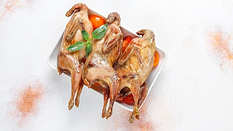
Alternative Proteins
Alternative proteins encompass lab-cultivated, cell-based meat, dairy, and seafood, as well as novel methods of producing proteins (e.g., upcycling carbon dioxide).
Articles
More ArticlesNever miss the latest news and trends driving the food safety industry
eNewsletter | Website | eMagazine
JOIN TODAY!Copyright ©2025. All Rights Reserved BNP Media.
Design, CMS, Hosting & Web Development :: ePublishing


